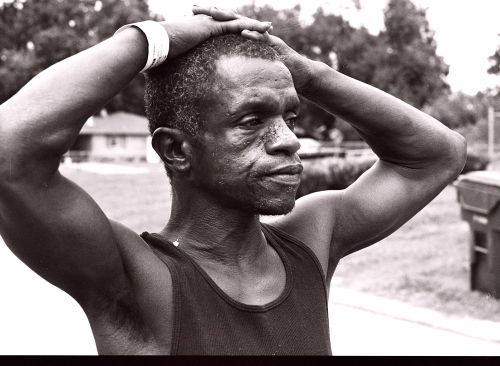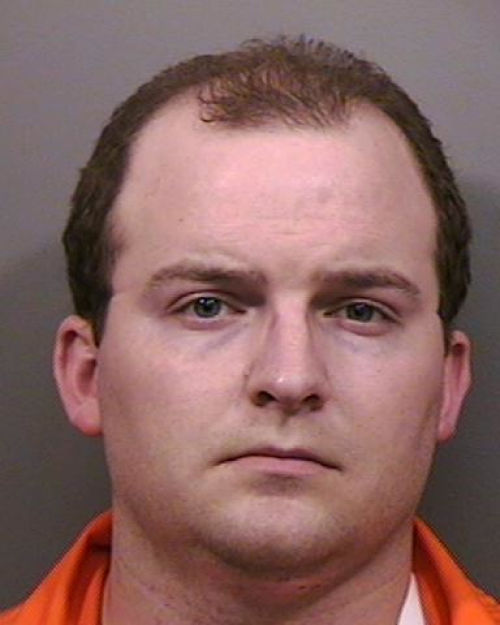
‘Bayou Blue’ recalls serial killer
April 8, 2014
Laf. headland project receives another $144.6M
April 8, 2014An attorney who represented convicted killer and rapist Chad Roy Louviere admitted Monday that the thought of seeking a competency hearing during his 1999 proceedings never occurred to her, despite what she said were strong indications that the former deputy had mental health problems.
Failure of Louviere’s former lawyers to adequately defend him during his capital murder case is a key element of his current counsel to seek a new trial.
Louviere was convicted of rape in one trial, capital murder in another and sentenced to death following a 1997, 25-hour hostage standoff at the former ArgentBank on Grand Caillou Road, where his ex-wife had worked.
Bank teller Pamela Duplantis was killed when Louviere fired the rifle he brought with him to the bank while still in his uniform.
He pleaded guilty to murder, kidnapping and related charges on the advice of his attorneys at the time, with no promise of leniency. A jury then decided if he should live or die, choosing the latter.
Under questioning from attorney Caroline Tillman of the New Orlean-based Capital Appeals project, retired lawyer Phyllis Mann told of how she came on board Louviere’s defense team shortly after he entered his plea, assisting lead counsel David Stone.
Mann testified that she walked into a case that was in shambles.
“Investigations were not completed, nothing was organized, (Stone) was downright frantic,” said Mann, who confessed to difficulty understanding the logic of throwing a case to a jury for the question of life or death after a guilty plea.
“I was pretty well horrified at that part,” she said. “I was horrified.”
Stone, Mann said, wrote his opening statement for Louviere’s sentencing trial while driving from Baton Rouge to Houma, on the morning he was to deliver it.
Louviere’s own words and actions coupled with information gleaned from court records, Mann said, convinced her that the best course of action would have been a plea of “not guilty by reason of insanity.”
Mann’s testimony supported the contention filed in court papers that Louviere was never offered that option. She did file a request to withdraw her client’s plea, which former District Judge Jimmy Gaidry refused to grant, without explanation.
The court papers Mann filed stated the guilty plea was entered without being “knowing and voluntary.”
“Was it your impression that Mr. Louviere was mentally ill?” Tillman asked.
“Yes,” Mann replied. “Almost immediately.”
At several points Assistant District Attorneys Ellen Doskey and Carlos Lazarus objected to testimony they said placed the witness in the role of drawing conclusions about what other people, including Louviere, were thinking. In almost all those instances District Judge Johnny Walker, who presides over Louviere’s post-conviction relief bid, sustained them.
At one point Doskey pointedly asked Mann why she did not file a request for Louviere to plead not guilty by reason of insanity. Mann countered that she would have to first convince the court to withdraw the guilty plea, before presenting another option.
“There was no way to raise an insanity defense if the plea was not knowing and voluntary,” said Mann, who based her assertions of Louviere’s lack of mental fitness on his allegedly incessant attention to detail, obsession with minutia, and evidence of a paranoid personality through letters he wrote and words he spoke.
“He was extraordinarily paranoid,” Mann said. “He believed he was in danger anytime he was in Terrebonne Parish.”
Despite those statements, Mann said she never thought to request tests to determine if Louviere was competent to stand trial, and therefore whether he was competent to enter a guilty plea.
Had he been found not competent to proceed, Louviere’s plea might not have been allowed to remain. But the failure of anyone to seek a competency hearing was not included in the reasons given for plea withdrawal in papers she filed.
Doskey questioned Mann aggressively but politely about the decision.
“I simply didn’t think of it,” Mann said.
“That option was not part of your strategy,” Doskey said.
Mann demurred, stating that was not what she said.
“I should have thought of it but I didn’t think of it,” said Mann, her composure appearing to unravel.
Walker heard testimony from another witness Monday, an attorney who represented Louviere in the divorce action his ex-wife had brought prior to the bank standoff.
Eddie Pularo said that when he spoke with Louviere there were no signs of outward distress about the divorce, although he wasn’t happy about it.
Court papers filed by Louviere’s appellate team allege that he was greatly undone by the divorce, and how that along with other factors led to a breakdown resulting in the raid on the bank.
Testimony – including an expected appearance by Stone – will continue May 28, with future court dates in June set to the calendar as well.
The current schedule deals strictly with matters concerning Louviere’s mental issues; other points such as whether evidence showing that Louviere’s shooting of Duplantis was accidental were not employed by counsel.











